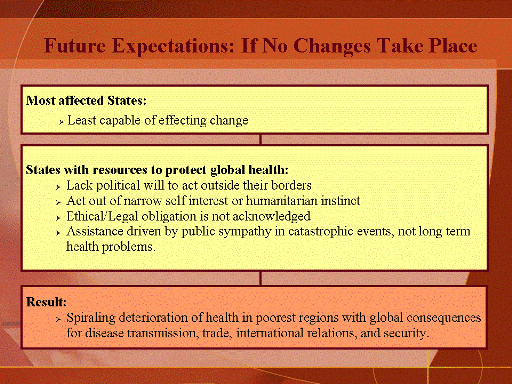| front |1 |2 |3 |4 |5 |6 |7 |8 |9 |10 |11 |12 |13 |14 |15 |16 |17 |18 |19 |20 |21 |22 |23 |24 |25 |26 |27 |28 |review |
 |
If I am correct that
ameliorating the most common causes of disease, disability, and
premature death require global solutions, then the future is
demoralizing. The States that bear the disproportionate burden of
disease have the least capacity to do anything about it. And the
States that have the wherewithal are deeply resistant to expending
the political capital and economic resources necessary to truly make
a difference to improve health outside their borders. When rich
countries do act, it is often more out of narrow self-interest or
humanitarian instinct than a full sense of ethical or legal
obligation. The result is a spiraling deterioration of health in the
poorest regions, with manifest global consequences for cross-border
disease transmission and systemic affects on trade, international
relations, and security.
Suppose that States were
convinced that amelioration of global health hazards was in their
national interests or that they otherwise accepted the claim that
they have an ethical or legal obligation to act. Would the
consequent funding and efforts make a difference? If past history is
any guide, the answer is no. Most development assistance is driven
by high profile events that evoke public sympathy, such as a natural
disaster in the form of a hurricane, tsunami, draught, or famine; or
an enduring catastrophe such as AIDS; or politicians may lurch from
one frightening disease to the next, irrespective of the level of
risk ranging from anthrax and smallpox to SARS, Influenza A (H5N1),
and bioterrorism.
|